1591 Born: Guercino, Italian painter (d. 1666)
Giovanni Francesco Barbieri (February 8, 1591 – December 22, 1666), better known as Guercino, or il Guercino, was an Italian Baroque painter and draftsman from Cento in the Emilia region, who was active in Rome and Bologna. The vigorous naturalism of his early manner contrasts with the classical equilibrium of his later works. His many drawings are noted for their luminosity and lively style.
Guercino was remarkable for the extreme rapidity of his executions: he completed no fewer than 106 large altarpieces for churches, and his other paintings amount to about 144. He was also a prolific draftsman. His production includes many drawings, usually in ink, washed ink, or red chalk. Most of them were made as preparatory studies for his paintings, but he also drew landscapes, genre subjects, and caricatures for his own enjoyment. Guercino's drawings are known for their fluent style in which "rapid, calligraphic pen strokes combined with dots, dashes, and parallel hatching lines describe the forms". Guercino continued to paint and teach until his death in 1666, amassing a notable fortune. As he never married, his estate passed to his nephews and pupils, Benedetto Gennari II and Cesare Gennari.
Stamps from Ireland and San Marino depicting Guercino's art
1725 Died: Peter the Great, Russian emperor (b. 1672)
Peter the Great (Peter I or Peter Alexeyevich 9 June 1672 – 8 February 1725) ruled the Tsardom of Russia and later the Russian Empire from 7 May 1682 until his death in 1725, jointly ruling before 1696 with his elder half-brother, Ivan V. Through a number of successful wars, he expanded the Tsardom into a much larger empire that became a major European power and also laid the groundwork for the Russian navy after capturing ports at Azov and the Baltic Sea. He led a cultural revolution that replaced some of the traditionalist and medieval social and political systems with ones that were modern, scientific, Westernised and based on the Enlightenment. Peter's reforms had a lasting impact on Russia, and many institutions of the Russian government trace their origins to his reign. He is also known for founding and developing the city of Saint Petersburg, which remained the capital of Russia until 1917.
Russian stamps depicting Peter the Great
1820 Born: William Tecumseh Sherman, American general (d. 1891)
William Tecumseh Sherman (February 8, 1820 – February 14, 1891) was an American soldier, businessman, educator, and author. He served as a general in the Union Army during the American Civil War (1861–1865), receiving recognition for his command of military strategy as well as criticism for the harshness of the scorched earth policies he implemented in conducting total war against the Confederate States. British military theorist and historian B. H. Liddell Hart declared that Sherman was "the first modern general".
Born in Ohio to a politically prominent family, Sherman graduated in 1840 from the United States Military Academy at West Point. He interrupted his military career in 1853 to pursue private business ventures, and at the outbreak of the Civil War he was superintendent of the Louisiana State Seminary of Learning & Military Academy (now Louisiana State University). Sherman distinguished himself at the First Battle of Bull Run in 1861, before being transferred to the Western Theater. Stationed in Kentucky, his pessimism about the outlook of the war led to a nervous breakdown that required him to be briefly put on leave. He recovered by forging a close partnership with General Ulysses S. Grant. Sherman served under Grant in 1862 and 1863 during the battles of forts Henry and Donelson, the Battle of Shiloh, the campaigns that led to the fall of the Confederate stronghold of Vicksburg on the Mississippi River, as well as the Chattanooga Campaign that culminated with the routing of the Confederate armies in the state of Tennessee.
In 1864, Sherman succeeded Grant as the Union commander in the Western Theater. Sherman then led the capture of the strategic city of Atlanta, a military success that contributed to the re-election of President Abraham Lincoln. Sherman's subsequent march through Georgia and the Carolinas involved little fighting but large-scale destruction of cotton plantations and other infrastructure, a systematic policy intended to undermine the ability and willingness of the Confederacy to continue fighting. Sherman accepted the surrender of all the Confederate armies in the Carolinas, Georgia, and Florida in April 1865, but the terms that he negotiated were considered too lenient by US Secretary of War Edwin Stanton, who ordered General Grant to modify them.
When Grant became president of the United States in March 1869, Sherman succeeded him as Commanding General of the Army. Sherman served in that capacity from 1869 until 1883 and was responsible for the U.S. Army's engagement in the Indian Wars during that period. He steadfastly refused to be drawn into politics and in 1875 published his Memoirs, one of the best-known first-hand accounts of the Civil War.
US stamps depicting William Tecumseh Sherman
Jules Gabriel Verne (8 February 1828 – 24 March 1905) was a French novelist, poet, and playwright.
Verne's collaboration with the publisher Pierre-Jules Hetzel led to the creation of the Voyages extraordinaires, a widely popular series of scrupulously researched adventure novels including Journey to the Center of the Earth (1864), Twenty Thousand Leagues Under the Sea (1870), and Around the World in Eighty Days (1873).
Verne is generally considered a major literary author in France and most of Europe, where he has had a wide influence on the literary avant-garde and on surrealism. His reputation was markedly different in Anglophone regions where he had often been labeled a writer of genre fiction or children's books, largely because of the highly abridged and altered translations in which his novels have often been printed (until the 1980s, when his "literary reputation ... began to improve").
Verne has been the second most-translated author in the world since 1979, ranking between Agatha Christie and William Shakespeare. He has sometimes been called the "Father of Science Fiction", a title that has also been given to H. G. Wells, Mary Shelley, and Hugo Gernsback.
Stamps from various countries issued to commemorate Jules Verne and his works


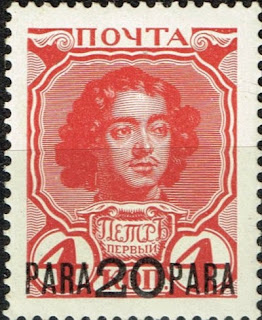
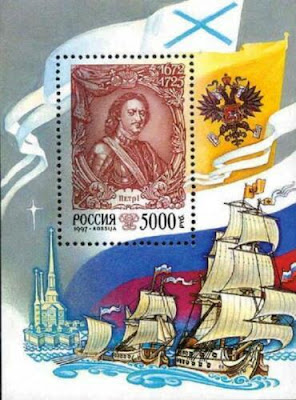




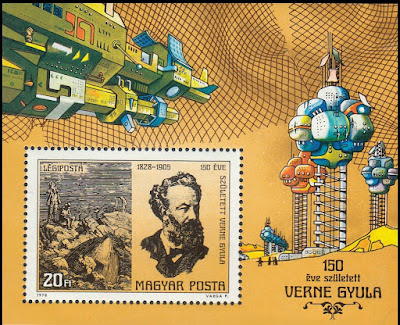
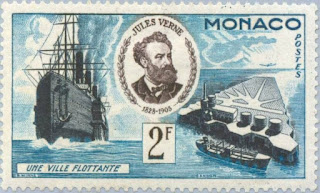

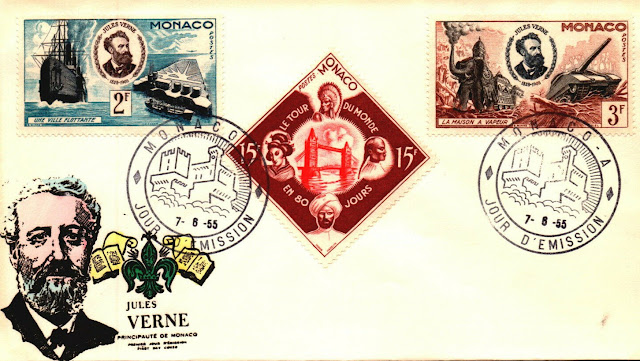
No comments:
Post a Comment